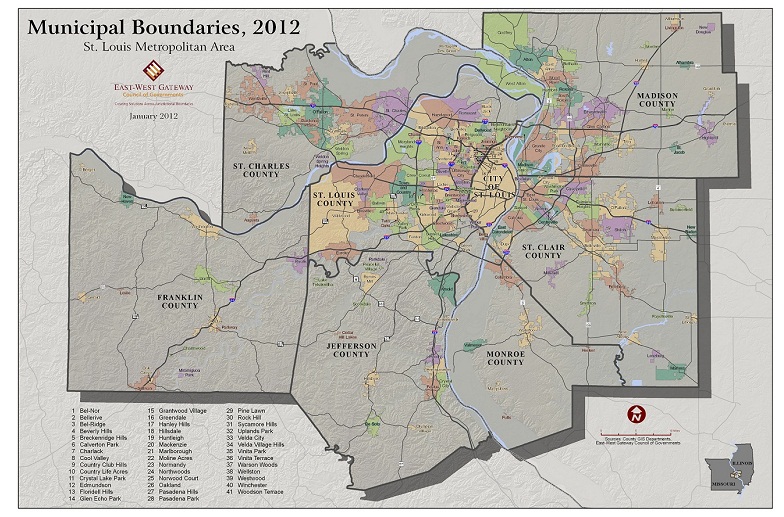
IN THIS ISSUE:
Township of West Windsor Designated a Transit Village
Ohio’s Brownfield Action Plan Pilot Program
Submetering: An Approach to Tracking Energy Expenditures
Grantee Spotlight: St. Louis Plans for Regional Renewal
Grantee Spotlight: St. Louis Plans for Regional Renewal

Image courtesy of East-West Gateway Council of Governments In the heartland of America at the “Meeting of the Great Rivers,” where the Mississippi and Missouri Rivers converge, lies the city of St. Louis. With a footprint that extends into both Missouri and Illinois, the St. Louis metropolitan area offers residents one of the most scenic stretches of roadway in the Midwest. Home to more than 2.8 million people, the area has minimal crime, plentiful recreation opportunities, and great schools, earning it a place on Parenting Magazine’s list of the best places to raise a family. But even with such honors, the region still has its share of challenges; the East-West Gateway Council of Governments (EWG) finds that decades of unplanned growth in the region have led to a mismatch of jobs and housing. Over 150,000 low- and moderate-income workers commute more than 20 miles to work, annually discharging the equivalent of 750,000 tons of carbon monoxide into the environment. To help alleviate the job-housing mismatch and reduce the associated housing and transportation costs, EWG is pursuing a regional plan with the help of a $4.7 million Regional Planning grant awarded through HUD’s Sustainable Communities program. Leveraging $3.5 million locally, greater St. Louis is readying itself for a regional renewal.
East-West Gateway Council of Governments Regional Planning Grant
Launched in May 2011, the Regional Plan for Sustainable Development engages a three-year regional planning process within an eight-county planning area to address the following goals: build the capacity of regional leaders to address sustainability issues, connect multiple planning efforts across the region into a cohesive vision, and maximize municipal resources and investments. With more than 850 distinct governmental units in the St. Louis metropolitan area, the plan aims to rally support from local leaders to promote regional cooperation and collaboration. As Jennifer Howland, sustainability planning manager at EWG, says, “Even though communities have their own set of budget priorities, we believe there are common challenges everyone is facing, and to be smart with our money and resources, [we want to have stakeholders] come together in one room and talk about sustainability.”
In November 2011, EWG conducted a regionwide survey to assess attitudes about housing, transportation, and public services, as well as environmental and economic competitiveness goals. Respondents identified key priorities, including greater homeownership opportunities and an affordable, regional public transit system. EWG created a consortium of 11 integral community partners, as well as hundreds of additional partners from various public, private, and nonprofit organizations. Select members from the consortium make up a steering committee that provides oversight and leadership. In addition, the consortium has three working subcommittees responsible for research and data management, public engagement and outreach, and implementation.
The steering committee recently selected 11 Community Planning Areas (CPAs) within the region (comprised of 3 to 8 municipalities) that function as mini-planning communities. Each CPA fosters local dialogue and community engagement, analyzes planning needs (such as infrastructure, housing, and economic development), and determines a short- and long-term sustainability framework. These 11 CPAs will host a series of public meetings and scenario planning sessions over the year ahead (beginning in March 2012) and will submit preferred goals, strategies, development scenarios, and policies to the steering committee for inclusion in the regional development scenario.
Estimated for completion in early 2014, the regional plan is meant to be flexible, allowing municipalities to customize the plan to meet local needs. As such, Howland believes that the regional planning process is building a foundation for communities to realize their own potential in their own way. “We are not trying to set up regionwide mandates from MPO [Metropolitan Planning Organization] to municipalities, but [instead] give them tools they can select from to figure out how to rally sustainability for their community. We’re all going through the same future, but we may have a different path.” In addition to the regional sustainable plan, the process will result in tangible products such as development toolkits aimed at guiding individuals, communities, and organizations toward sustainable planning options and an online data portal with regional information. Other outcomes include a transit-oriented development study of the region’s Metrolink light rail, a booklet on stormwater runoff management for development, a regional housing analysis, and multiple geographic information system-based bicycle and pedestrian plans.
About the Partnership for Sustainable Communities
The Partnership for Sustainable Communities, a special partnership among HUD, the U.S. Department of Transportation, and the U.S. Environmental Protection Agency, coordinates federal housing, transportation, water, and other infrastructure investments to make neighborhoods more prosperous, allow people to live closer to their jobs, save households time and money, and reduce pollution. For more on the Partnership, including the six livability principles that guide its work, please visit our website.
